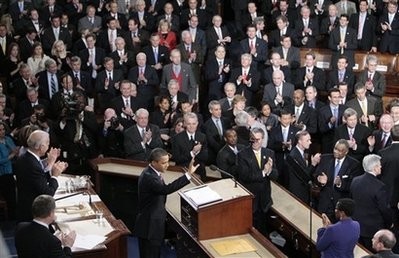Declaring "I don't quit,'" an embattled President Barack Obama vowed in his first State of the Union address Wednesday night to make job growth his topmost priority and urged a divided Congress to boost the still-ailing economy with fresh stimulus spending. Defiant despite stinging setbacks, he said he would not abandon ambitious plans for longer-term fixes to health care, energy, education and more.
"Change has not come fast enough," Obama said before a politician-packed House chamber and a TV audience of millions. "As hard as it may be, as uncomfortable and contentious as the debates may be, it's time to get serious about fixing the problems that are hampering our growth."
Obama looked to change the conversation from how his presidency is stalling — over the messy health care debate, a limping economy and the missteps that led to Christmas Day's barely averted terrorist disaster — to how he is seizing the reins.

A chief demand was for lawmakers to press forward with his prized health care overhaul, which is in severe danger in Congress, and to resist the temptation to substitute a smaller-bore solution for the far-reaching changes he wants.
"Do not walk away from reform," he implored. "Not now. Not when we are so close."
On national security, Obama proclaimed some success, saying that "far more" al-Qaida terrorists were killed under his watch last year in the U.S.-led global fight than in 2008.
Hoping to salve growing disappointment in a key constituency, Obama said he would work with Congress "this year" to repeal the ban on gays and lesbians serving openly in the military. But in a concession to concern about the move among Republicans and on his own party's right flank, Obama neither made a commitment to suspend the practice in the interim nor issued a firm deadline for action.
The president devoted about two-thirds of his speech to the economic worries foremost on Americans' minds, emphasizing his ideas, some new but mostly old and explained anew, for restoring job growth, taming budget deficits and changing a polarized Washington "where every day is Election Day." These concerns are at the roots of voter emotions that once drove supporters to Obama but now are turning on him as he governs.
Declaring that "I know the anxieties" of Americans' struggling to pay the bills while big banks get bailouts and bonuses, Obama prodded Congress to enact a second stimulus package "without delay," specifying that it should contain a range of measures to help small businesses and funding for infrastructure projects. Also, fine tuning a plan first announced in October, Obama said he will initiate a $30 billion program to provide money to community banks at low rates, provided they agree to increase lending to small businesses. The money would come from balances left in the $700 billion Wall Street rescue fund — a program "about as popular as a root canal" that he made of point of saying "I hated."
Acknowledging frustration at the government's habit of spending more than it has — and yet placing much blame on Republicans for record deficits, he said he would veto any bills that do not adhere to his demand for a three-year freeze on some domestic spending (while proposing a 6.2 percent, or $4 billion, increase in the popular arena of education). He announced a new, though nonbinding bipartisan deficit-reduction task force (while supporting the debt-financed jobs bill). And he said he would cut $20 billion on inefficient programs in next year's budget and "go through the budget line by line" to find more.
Positioning himself as a fighter for the regular guy and a different kind of leader, he urged Congress to require lobbyists to disclose all contacts with lawmakers or members of his administration and to blunt the impact of last week's Supreme Court decision allowing corporations greater flexibility in supporting or opposing candidates.
Even before Obama spoke, some of the new proposals, many revealed by the White House in advance, were dismissed — on the right or the left — as poorly targeted or too modest to make a difference. And one of Obama's economic point men, Treasury Secretary Timothy Geithner, was verbally pummeled by Democrats and Republicans alike over his role in the $180 billion bailout of insurance giant AIG Inc., a venting of the public's anger about Wall Street.
In the Republican response to Obama's speech, Gov. Bob McDonnell of Virginia showed no sign of his party capitulating to the president.
In fact, the choice of McDonnell to represent Republicans was symbolic, meant to showcase recent GOP election victories by him and others. McDonnell reflected the anti-big government sentiment that helped lead to their wins, saying in excerpts from his own post-speech remarks that Americans want good health care they can afford, just not by turning over "the best medical care system in the world to the federal government."
























